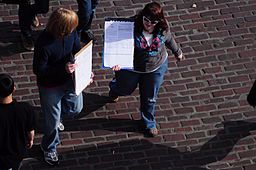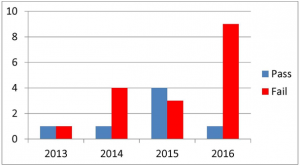
Despite Recent Uptick in Developer-Sponsored Initiatives, Voters Remain Wary
June 27, 2017Photo credit: Joe Mabel, CC BY-SA 3.0, via Wikimedia Commons
In Tuolumne Jobs & Small Business Alliance v. Superior Court (2014) 59 Cal.4th 1029, the California Supreme Court held that CEQA does not apply to voter-sponsored initiatives, even where the initiative is adopted by local officials rather than the voters. Since that decision, California cities and counties have seen a sharp increase in development projects being proposed by the ballot. These developer-sponsored, voter initiatives typically seek a full suite of land use approvals for a particular project or development plan. If adopted, such initiatives have the potential to significantly limit the scope of future CEQA review. In addition, because voter initiatives can only be revised by another vote of the people, successful developer-sponsored initiatives can place the regulations that govern a project beyond the local government’s reach.
Voter-sponsored initiatives are not subject to CEQA
It has long been established that CEQA compliance is not required before a legislative body submits a voter-sponsored initiative to the voters under Elections Code section 9214(b). See, e.g., DeVita v. County of Napa (1995) 9 Cal.4th 763, 793-95. The CEQA Guidelines have codified this exemption to CEQA compliance. See Guidelines § 15378(b)(3).
In Tuolumne Jobs & Small Business Alliance, the Supreme Court held that voter-sponsored initiatives that are adopted outright by the local decision-making body are not subject to CEQA either. The Legislature has established procedures for promptly processing voter-sponsored initiatives, and, according to the Court, these procedures “would essentially [be] nullif[ied]” if time-consuming CEQA review were required before direct adoption of a voter-sponsored initiative. Id. at 1036-37. In addition, cities would not be able to act on the results of CEQA review because they do not have the authority to reject or modify projects proposed by initiative. Id. at 1040. Further, voters may fall back on the referendum power to stop a direct-adopted initiative from going into effect. Id. at 1043. In sum, the Court held that “[b]ecause CEQA review is contrary to [the statutes governing voter-sponsored initiatives], and because policy considerations do not compel a different result, such review is not required before adoption of a voter initiative.” Id. at 1036-37; see Elec. Code §§ 9212, 9214.
The Court acknowledged that this rule could allow developers to evade CEQA, but noted that any such concerns should be directed to the Legislature. Tuolumne Jobs, 59 Cal.4th at 1043. This means that an optional Elections Code report is “the exclusive means for assessing the potential environmental impact of such initiatives.” Id. at 1036.
Council-sponsored initiatives remain subject to CEQA
In Friends of Sierra Madre v. City of Sierra Madre (2001) 25 Cal.4th 165, the Supreme Court held that a city council’s decision to place its own measure on the ballot was held to be a discretionary act, not ministerial, and therefore not exempt from CEQA. Tuolumne Jobs did not alter this rule.
Legislative fix?
In February 2017, Assembly Member Jose Medina introduced AB 890 as a “legislative fix” to address Tuolumne Jobs. The bill proposes to require CEQA review for certain voter-sponsored land use initiatives before they are circulated for signature. The bill’s author explained that “the CEQA review process has been increasingly undermined by California’s initiative process, a once highly regarded vital check on corporate influences over our government.”
As of the submittal of this article, AB 890 faced significant opposition, including from the League of California Cities. It remains to be seen whether AB 890’s provisions, if enacted into law, would apply to all or only some voter-sponsored initiatives. Local governments may track AB 890 here.
Election Results: Developer-Sponsored Initiatives 2013-2016
Regardless of any “legislative fix” proposed by AB 890, developer-sponsored initiatives do not appear to have much traction with California voters. We canvassed election results for commercial and residential developer-sponsored measures from 2013-2016. The data are presented in graphic and tabular format below, and suggest the following conclusions:
- Few developer-sponsored measures are adopted outright by legislative bodies and not subjected to a referendum vote. Professional sports stadiums are the exception and tend to be adopted outright by city councils.
- Most measures that go to the voters—either as initiatives or referenda following outright adoption—fail to pass, especially if they propose primarily residential projects.
- Commercial projects fare slightly better at the polls, but still face uphill battles.
- Based on these results, it is our conclusion that developer-sponsored initiatives do not appear to be a “silver bullet” for short-circuiting the CEQA and administrative permitting process.
Development Initiatives: Election Results 2013-2016

| November 2016 | |||
| City/County | Measure | Name | Result |
| San Diego County | Measure B | Lilac Hills Residential and Commercial Development | DEFEATED
Yes 36.46% No 63.54% |
| City of Beverly Hills | Measure HH | Hilton Condominium Tower | DEFEATED
Yes 45.85% No 55.15% |
| City of Cupertino | Measure D | Vallco Shopping Center | DEFEATED
Yes 45% No 55% |
| City of Cypress | Measure GG | Town Center and Commons Plan –
Initiative to authorize development of a town center, housing, and a public park. |
DEFEATED
Yes 48.9% No 51.1% |
| City of Pacifica | Measure W | Rockaway Quarry Residential Development | DEFEATED
Yes 31.14% No 68.86%
|
| November 2016 | |||
| City/County | Measure | Name | Result |
| City of Poway | Measure W | Maderas Golf Course Hotel | DEFEATED
Yes 48.54% No 51.46% |
| Other 2016 | |||
| City of Carlsbad | Measure A | Agua Hedionda South Shore Specific Plan
*Referendum of a Council-adopted, developer-sponsored initiative |
DEFEATED
Yes 48.8% No 51.2% |
| City of Richmond | Measure N | Riveria Residential Development | DEFEATED
Yes 33.76% No 66.24% |
| City of Davis | Measure A | Nishi Property Land Use Designation and Development Project | DEFEATED
Yes 48.47% No 51.53% |
| City of San Ramon | N/A | Faria Housing Project
*Council-adopted, developer-sponsored initiative |
Adopted outright by the City Council |
| November 2015 | |||
| City of Malibu
|
Measure W | Shopping Center at Cross Creek and Civic Center Way | DEFEATED
Yes 42.87% No 57.13% |
| City of Moreno Valley | N/A | World Logistics Center
*Council-adopted, developer-sponsored initiative |
Adopted outright by the City Council |
| Other 2015 | |||
| City of Redondo Beach | Measure B
(March 2015) |
AES Power Plant Removal & Harbor Village Development Plan Initiative | DEFEATED
Yes 47.6% No 52.4% |
| City of Hermosa Beach
|
Measure O (March 2015) | E&B Oil Drilling and Production Project | DEFEATED
Yes 20.49% No 79.5%
|
| Other 2015 | |||
| City/County | Measure | Name | Result |
| City of Chino | Measure V
(March 2015) |
General Plan Amendment to Rezone Land from Commercial to Residential (12.7 acres, to allow maximum of 113 single-family dwelling units)
*owner of the land reimbursed the City for the full cost to conduct the election & no opposition arguments submitted to ballot |
PASSED*
Yes: 55.71% No: 44.29% |
| City of Carson | N/A | Zoning initiative for a professional football stadium for the Oakland Raiders and the San Diego Chargers
*Council-adopted, developer-sponsored initiative **Later passed over by NFL for Hollywood Park stadium below |
Adopted outright by the City Council |
| City of Inglewood | N/A | City of Champions Revitalization Initiative for a Hollywood Park professional football stadium, backed by Rams owner
*Council-adopted, developer-sponsored initiative |
Adopted outright by the City Council |
| November 2014 | |||
| Union City | Measure KK | Flatlands Development Initiative
Initiative to amend the City’s General Plan and Hillside Area Plan to allow for the development of 63 acres of Flatlands privately owned by the Masons of California. |
DEFEATED
Yes 34.15% No 65.85% |
| City of Riverside
|
Measure L | La Sierra Hills Preservation and La Sierra Lands Development Initiative
Development portion of proposal would have allowed for 1,950 additional residential units to be constructed in the La Sierra Lands.
|
DEFEATED
Yes 42.80% No 57.20% |
| November 2014 | |||
| City/County | Measure | Name | Result |
| City of Newport Beach | Measure Y | General Plan Land Use Element Amendment
Proposed amendment for reduction of non-residential development square footage by 375,782 square feet, while concurrently increasing the number of residential dwelling units by 138 units. |
DEFEATED
Yes 30.70% No 69.30% |
| City of Escondido Lakes | Proposition H | Specific Plan Initiative (For residential and recreational development) | DEFEATED
Yes 39.37% No 60.63% |
| Other 2014 | |||
| Town of Los Gatos (June 2014)
|
Measure A | Netflix Construction Project Rezoning “Albright Way” Initiative
*Note that opponents and proponents of the measure settled the essential disputes over the development, thereby making the initiative superfluous however at that point it was too late to withdraw from the ballot. |
PASSED*
Yes: 71.69% No: 28.31% |
| 2013 | |||
| San Francisco | Proposition B | 8 Washington Street Development Initiative
Development project for new housing, retail and recreational facilities, and open space |
DEFEATED
Yes 37.21% No 62.79% |
| Town of Apple Valley
|
Measure D | Walmart Initiative | PASSED
(nullified by subsequent litigation) |
| PASS RATE between 2013 to 2016: 7/24 (29%)*
Assumes that Council-adopted initiatives not overturned by referendum “passed.” |
|||
Catherine Engberg presented on this topic at the League of California Cities City Attorney’s Spring Conference (May 2017). You can find a full copy of her paper here.
For more information, contact SMW attorney Catherine Engberg.
This article is intended for information purposes only and is not legal advice. This article is not intended to be a source of solicitation. This article is intended, but is not promised or guaranteed, to be correct, complete, and up-to-date. This article does not constitute a guarantee, warranty, or prediction regarding the outcome of any legal matter. Readers should not act on the information provided in this article without seeking professional legal counsel.